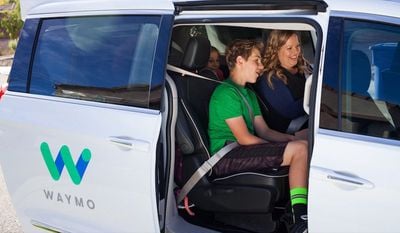After opening up a self-driving car program to the public in Phoenix, Arizona last month, Alphabet-owned Waymo has now officially partnered with ride-hailing app Lyft (via The New York Times). The two will work together in order "to bring autonomous vehicle technology into the mainstream" by launching various pilot projects and helping one another to develop products for the mass market.
Like its rival Uber, Lyft has been looking into autonomous vehicle technology recently, but the company lacked extensive research and development it needed to launch a self-driving car program on a wide scale. Waymo has that tech, but doesn't have the reach of Lyft, which currently operates in approximately 300 cities in the United States. In a statement, Lyft said that the partnership will help forward a "shared vision" that each company has of a self-driving future.

As The New York Times pointed out, it also suggests that Waymo thinks its self-driving-car technology "has moved past the research stage and is ready to be applied commercially."
“Waymo holds today’s best self-driving technology, and collaborating with them will accelerate our shared vision of improving lives with the world’s best transportation,” a Lyft spokeswoman said in a statement.
A Waymo spokesman said, “Lyft’s vision and commitment to improving the way cities move will help Waymo’s self-driving technology reach more people, in more places.”
The specifics of what type of vehicles and products that drivers and riders might see from the collaboration were left unconfirmed, as was a launch window for any related self-driving program. Waymo said that its early, closed test of self-driving cars in Phoenix was a success, which led to the company's decision to expand the test to 600 self-driving Chrysler Pacifica Hybrid minivans.
Uber has tested and faced trouble in the autonomous vehicle space in the past, resulting in the removal of its self-driving cars from the roads in California as well as a lawsuit aimed at the company, filed by Waymo. U.S. federal prosecutors are investigating Waymo's claim that former Google employee Anthony Levandowski stole 14,000 confidential files, including data on Waymo's LiDAR system, which the company called "one of the most powerful parts" of its self-driving technology.
Levandowski left Google's self-driving project for Otto, a self-driving trucking company that Uber acquired for more than $680 million last year. U.S. district judge William Alsup partially granted Waymo's bid for an injunction as the case remains ongoing, and could ultimately roadblock any further progress Uber attempts to make in its autonomous vehicle efforts.
Apple is believed to be working on an autonomous driving system as well, with an end-of-2017 deadline for the team to "prove the feasibility" of the tech, so the company can then decide what direction it wants to take in the self-driving market.
























Top Rated Comments
I just foresee this technology in taxi-type vehicles unearthing all kinds of new privacy issues. The cars will undoubtedly be loaded with mics and cameras both externally and inside the cabin. I wonder how many people will sit inside the cars in silence with their phone never leaving their pocket for fear that someone is seeing/listening to what's going on inside the car? People who don't trust Google (which seems to be a rather large percentage of people on MR) probably won't even go within 10 feet of this fleet of vehicles for obvious reasons.
That's like having someone "help" you take your selfies, let's face it, they'll never capture you as good as you yourself can ;).